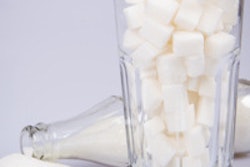The Center for Science in the Public Interest (CSPI) is urging the U.S. Food and Drug Administration (FDA) to determine a safe level of added sugars in soft drinks and other beverages to help in the fight against diabetes, heart disease, and other health issues -- including oral health -- caused by consuming too much sugar.
In a 54-page regulatory petition filed today with the FDA, the CSPI details the substantial scientific evidence that added sugars, especially in drinks, causes weight gain, obesity, and chronic diseases such as diabetes, heart disease, and gout.
A typical 20-ounce bottle of soda contains about 16 teaspoons of sugars from high-fructose corn syrup, the CSPI noted. That's twice the daily limit recommended by the American Heart Association, which advises consuming no more than 6 teaspoons of added sugars per day for women and no more than 9 teaspoons for men.
CSPI and scientists supporting the petition say that despite the concerns over artificial sweeteners, diet sodas are safer than today's full-calorie sodas.
"As currently formulated, Coke, Pepsi, and other sugar-based drinks are unsafe for regular human consumption," said CSPI Executive Director Michael F. Jacobson in a press release. "The FDA should require the beverage industry to re-engineer their sugary products over several years, making them safer for people to consume, and less conducive to disease."
Soda and other sugar drinks are the single biggest source of calories in the American diet, the CSPI noted. On average, Americans consume between 18 and 23 teaspoons -- about 300 to 400 calories worth -- of added sugars per day.
In addition to asking the FDA to reduce levels of added sugars in beverages, CSPI's petition urges the FDA to encourage industry to voluntarily reduce added sugars in breakfast cereals, baked goods, and other foods, though beverages are the biggest problem. The agency should add a separate line for added sugars on Nutrition Facts labels and mount education campaigns, perhaps with the Centers for Disease Control and Prevention, aimed at curbing consumption of added sugars, according to CSPI.



















